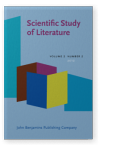Vol. 2:2 (2012) ► pp.218–242
Internally focalized narration from a linguistic point of view
Most definitions of the narratological notion of internal focalization are cast in terms of what the text represents, namely some character and her point of view. In being thus couched in representational terms, definitions of internal focalization do not mention any linguistic surface properties of the respective text. In this paper, we search for a way to specify the relation between linguistic surface properties and internal focalization. We start by giving a standard narratological account of internal focalization that is fully couched in representational terms. In the next section, we develop a brief but precise theory of linguistic perspective that operates on the text surface. This theory and our linguistic take on internal focalization then rest on the idea of shifted indexical expressions. Our account makes a clear empirical prediction in claiming that the interpretation of an internally focalized sentence will contain variables which will all be bound by the perspective holder. We thus conclude that internal focalization implies linguistic perspective in the sense that the focal character is always the linguistic perspective holder. Hence, our account states a necessary condition for internal focalization in linguistic terms.
